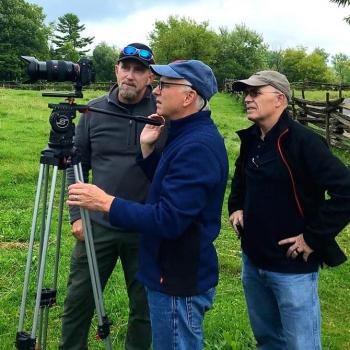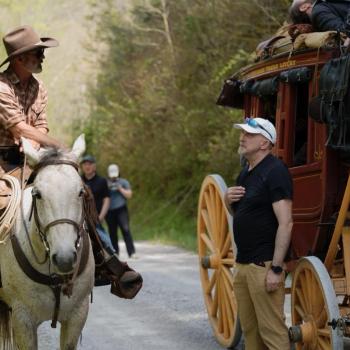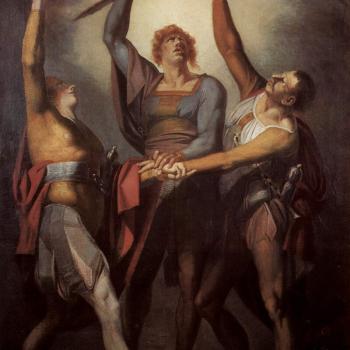
***
The Interpreter Foundation published several new items yesterday and today. I thought that you should know:
“Interpreting Interpreter: Enjoying Inherited Possessions”
This post is a summary of the article ““We Might Have Enjoyed Our Possessions and the Land of Our Inheritance”: Hebrew yrš and 1 Nephi 17:21” by Matthew L. Bowen in Volume 50 of Interpreter: A Journal of Latter-day Saint Faith and Scholarship.
The full article can be read at https://interpreterfoundation.org/we-might-have-enjoyed-our-possessions-and-the-land-of-our-inheritance-hebrew-yrs-and-1-nephi-1721/.
An introduction to the Interpreting Interpreter series is available at https://interpreterfoundation.org/interpreting-interpreter-on-abstracting-thought/.
““We Might Have Enjoyed Our Possessions and the Land of Our Inheritance”: Hebrew yrš and 1 Nephi 17:21,” by Matthew L. Bowen
Abstract: The verbal expression “we might have enjoyed,” as used in a complaint that Nephi attributes to his brothers, “we might have enjoyed our possessions and the land of our inheritance” (1 Nephi 17:21), reflects a use of the Hebrew verb yrš in its progressive aspect, “to enjoy possession of.” This meaning is evident in several passages in the Hebrew Bible, and perhaps most visibly in the KJV translation of Numbers 36:8 (“And every daughter, that possesseth [Hebrew yōrešet] an inheritance [naḥălâ] in any tribe of the children of Israel, shall be wife unto one of the family of the tribe of her father, that the children of Israel may enjoy [yîršû] every man the inheritance [naḥălat] of his fathers”) and Joshua 1:15 (“then ye shall return unto the land of your possession [lĕʾereṣ yĕruššatkem or, unto the land of your inheritance], and enjoy it [wîrištem ʾôtāh].” Examining Laman and Lemuel’s complaint in a legal context helps us better appreciate “land[s] of … inheritance” as not just describing a family estate, but as also expressing a seminal Abrahamic Covenant concept in numerous Book of Mormon passages, including the covenant implications of the resettlement of the converted Lamanites and reconverted Zoramites as refugees in “the land of Jershon” (“place of inheritance”).
“Interpreting Interpreter: “And now” as Verbal Punctuation,” by Kyler Rasmussen
This post is a summary of the article “Verbal Punctuation in the Book of Mormon I: (And) Now” by John Gee in Volume 50 of Interpreter: A Journal of Latter-day Saint Faith and Scholarship.
The full article can be read at https://interpreterfoundation.org/verbal-punctuation-in-the-book-of-mormon-i-and-now/.
An introduction to the Interpreting Interpreter series is available at https://interpreterfoundation.org/interpreting-interpreter-on-abstracting-thought/.
“Interpreting Interpreter: Explicating Archaic “That,”” by Kyler Rasmussen
This post is a summary of the article “A Comparison of the Book of Mormon’s Subordinate That Usage” by Stanford Carmack in Volume 50 of Interpreter: A Journal of Latter-day Saint Faith and Scholarship.
The full article can be read at https://journal.interpreterfoundation.org/a-comparison-of-the-book-of-mormons-subordinate-that-usage/.
An introduction to the Interpreting Interpreter series is available at https://interpreterfoundation.org/interpreting-interpreter-on-abstracting-thought/.
“Old Testament Commentary: Genesis 25-27: Jacob Takes Center Stage among the Descendants of Abraham,” by Jeffrey M. Bradshaw
“Old Testament Commentary: Genesis 24: A Wife for Isaac,” by Jeffrey M. Bradshaw
[Editor’s Note: Commentaries on the Book of Moses and Genesis Chapters 1 – 10 may be found on the ScripturePlus App from Book of Mormon Central and on the Bible Central website here.]
***
I spent the early afternoon today at a luncheon in the Ernest L. Wilkinson Student Center that was hosted by Brigham Young University’s College of Religious Education for winners of the College’s annual essay competition, and I briefly spoke at it. Many of the students in attendance were given generous cash prizes. All of the prize-winning writers were given a stack of gifts from various supporting organizations, including the Neal A. Maxwell Institute for Religious Scholarship, BYU Studies, Book of Mormon Central, and the Interpreter Foundation. Our contribution to the pile of gifts was a DVD of the Foundation’s theatrical film Witnesses, accompanied by a letter from me that ran as follows:
Since its founding in early August, 2012, the Interpreter Foundation (https://interpreterfoundation.org/) has been dedicated to considering, defending, and commending the scriptures and doctrines of the Church of Jesus Christ of Latter-day-Saints. It has emerged as a major source of new, original, insightful, and faithful scholarship on our scriptures, temples, and the ancient world, and a rich fountain of original research that is, in turn, popularized by Book of Mormon Central, FAIR, and others in order to reach a broad audience of non-members and members via videos, written materials, and social and other media.
At noon today, the Interpreter Foundation marked its five hundredth consecutive week of publishing at least one new article in its peer-reviewed online journal, which is accessible at no charge. (Many weeks, we’ve published two or even three.). Every Sunday evening, the Interpreter Radio Show broadcasts two hours of live discussion about Latter-day Saint scriptures, history, and doctrine, which are then archived and made freely available online. Last year, the Foundation’s first dramatic film, Witnesses, played in theaters across the United States; it is now available to the public via DVD and streaming. In a couple of weeks, on Friday evening, 4 March, the Foundation’s related docudrama, Undaunted: Witnesses of the Book of Mormon, will premiere at the annual LDS Film Festival and our next film project will be announced. Interpreter also maintains an active blog, sponsors conferences, and publishes books.
All of this is done by an almost entirely volunteer organization. We welcome manuscript submissions and we welcome committed volunteers. If you believe that the Restored Gospel, its scriptures, and its doctrines are worthy of serious thinking and reflection, we hope that you’ll take an interest in the work of Interpreter. In fact, we hope that you’ll join us. We can always use more help.
Daniel C. Peterson
[My email address]
***
I’m reading Der Richter und sein Henker [“The Judge and His Hangman”], by the late Swiss dramatist and novelist Friedrich Dürrenmatt, and I liked this passage, in which a pair of German Swiss detectives are questioning a French Swiss policeman (whose German isn’t exactly native) in connection with a murder:
“Was hat er denn für einen Beruf?”
“Philosophe.”
“Was verstehen Sie darunter, Charnel?”
“Ein Mann, der viel denken und nichts machen.”
“What sort of job does he have?”
“Philosopher.”
“What do you understand by that, Charnel?”
“A man who think a lot and do nothing.”












